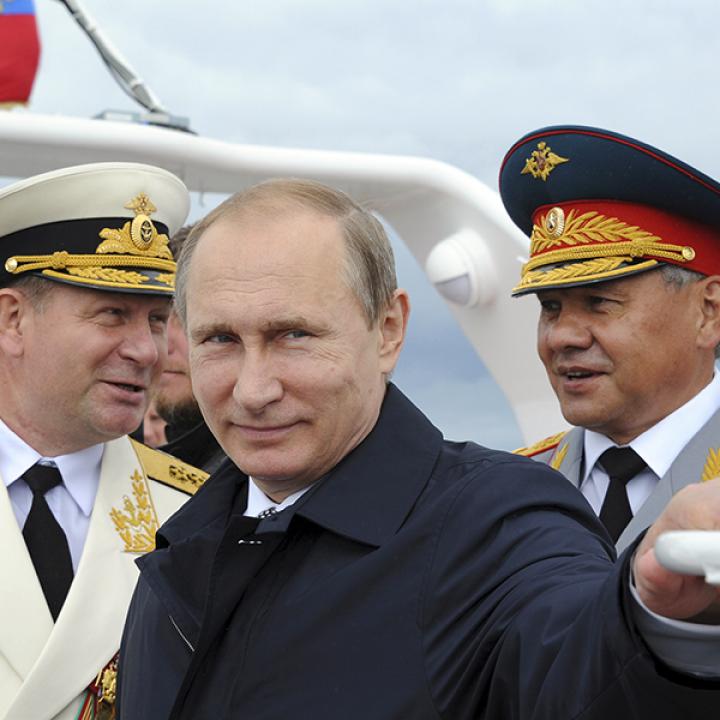
- Policy Analysis
- Articles & Op-Eds
What's Behind Moscow's Latest Threats in Syria

Bluster from the Kremlin should not be interpreted to mean Putin wants a direct military confrontation with the United States.
On June 19, the Russian Defense Ministry blasted the U.S. downing of the Syrian SU-22 as an "act of aggression" and a "violation of international law." Moscow cut the deconfliction channel with the U.S. and threatened to target U.S. and U.S. allies' aircraft flown west of the Euphrates, though the Pentagon soon said the deconfliction channel is still working. Meanwhile, the Russian press has been awash with reports about American "aggression" and support of "terrorists." Tellingly, one Russian Senator described U.S. actions in Syria as a provocation aimed at Russia.
The U.S. downed a Syrian SU-22 on June 18 in self-defense after the jet repeatedly ignored warnings and dropped several bombs on the U.S.-backed Syrian Democratic Forces (SDF) in the village of Ja'Din, southwest of Raqqa, according to the Pentagon. The SDF is the main and most effective U.S. partner fighting ISIS in Syria.
To be sure, the downing of the Syrian aircraft was significant. It signaled an escalation in Syria --an escalation that has been building up for weeks. The last time a U.S. aircraft shot down another country's plane in air-to-air combat was eighteen years ago, during the Kosovo campaign.
Yet when it comes to Russian President Vladimir Putin, we've seen this movie before. Moscow cut off the deconfliction line in April, following U.S. cruise missile strikes on the Syrian air base in response to one of the worst chemical attacks in Syria in years, which bore "all the hallmarks" of the Assad regime. But despite Kremlin bluster, the line soon officially reopened. Putin doesn't want a direct military confrontation with the U.S. in the Syrian skies. For one thing, he knows it's a fight he will lose.
It might seem surprising that Putin is condemning the SDF. It's a force dominated by the Kurds -- more specifically the Kurdish People's Protection Units (YPG) -- the armed wing of the Democratic Union Party and a Syrian offshoot of the Turkish Kurdistan Workers Party (PKK). Moscow's ties to the Kurds are deep. A Soviet proxy created the PKK during the Cold War. More recently, in March, YPG spokesman said the group had made an agreement to build a Russian base in Afrin.
Yet the Kurds, for Moscow, were always a means to an end. As ISIS is waning, Putin wants to ensure the U.S. and its allies don't fill the space. From Moscow's perspective, recent U.S. moves, from April 7 air strikes to arming the Kurds, show Washington is returning to the Middle East, and pushing Moscow out. Putin wants to control the Syrian narrative, and bluster seems to be his best option.
It comes as no surprise, then, that the Russian press has grown increasingly anti-Kurdish. As one author wrote in Nezavisimaya Gazeta on June 20, "By supporting the SDF and the Kurds, the Americans strengthen not only the separatist tendencies in the country, but also want to cut off the Assad regime from access to oil fields located in the combat zone and in the territory controlled by the IS."
Another Russian expert said on June 18, "If earlier the Americans somehow tried to veil their aggressive intentions towards Syria under the guise of fighting terrorism, now they are starting to act openly. Americans are de facto beginning aggression against Syria, but using Kurdish hands."
The Kurds, for their part, had put their eggs in both the Russian and American baskets, but invested more in the latter. Indeed, they always preferred to work with the U.S., and it is only poor U.S. diplomacy that pushed them away. Watching as the Trump administration doubles down on its commitment to the SDF, the Kurds in a way had already chosen the U.S. over Russia, which angers Putin. Another explanation for Moscow's behavior could be that a Kurdish force taking over the Arab town of Raqqa with U.S. help would make it harder for Assad to make good on his pledge to take back every inch of Syria.
To be sure, Moscow's threats to the U.S. and its allies in Syria have already produced results. Australia has suspended air combat missions over Syria. Such steps only demonstrate to Putin that bullying pays off. If Moscow follows through with its threat to target U.S. or U.S. allies' aircraft, the U.S. should respond. One thing the U.S. could do is reiterate that targeting, or what's called illumination by a targeting RADAR, is a hostile act authorizing the U.S. and its coalition forces to act in self-defense. Putin is not ten feet tall. He preys on weakness, and can be deterred if he knows he will lose a fight. Backing down will only fuel his aggression.
Anna Borshchevskaya is the Ira Weiner Fellow at The Washington Institute.
Forbes



